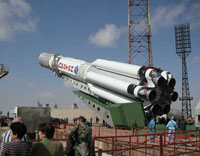Kazakhstan bans launches of Russia’s Proton rockets over toxic pollution fears
Kazakhstan has expanded the ban to launch Russian-made Proton rockets from its Baikonur spaceport. The decision was made following last week’s incident, when a Proton-M rocket with a Japanese communications satellite on board crashed soon after liftoff and spread toxic chemicals in the area.

The incident Thursday was the second time in the past 14 months that an unmanned Russian rocket launched from the Russian-leased Baikonur cosmodrome has strewn rocket fuel and debris, prompting angry statements from Kazakh officials.
Deputy Prime Minister Umirzak Shukeyev was quoted by Russian and Kazakh news media as saying the government had ordered flights of Proton-M rockets suspended.
The announcement follows a statement last week by officials at Russia's space agency that all Proton rocket launches had been suspended while experts investigated.
No one was injured in the incident, but some of the debris fell near the central Kazakh city of Zhezkazgan where President Nursultan Nazarbayev was on an official visit.
The Interfax news agency also quoted Shukeyev as saying that Kazakh officials have demanded more oversight over the launches, and to be allowed to coordinate them with Russian officials.
U.S.-based International Launch Services, the American-Russian joint venture coordinating the launch, said the Proton-M rocket failed to put the JCSAT-11 satellite into orbit because of a problem during the second stage of its launch.
Russia has been aggressively trying to expand its presence in the international market for commercial and government satellite and space-industry launches, though its efforts have seen several high-profile failures.
The malfunction of a Dnepr rocket in July 2006 also prompted angry statements from Kazakh officials and a suspension of unmanned launches.
It will soon become clear if Kazakhstan takes the problem of Russia’s Proton launches seriously or not. The official website of Moscow-based Mission Control says that the nearest launch from Baikonur is scheduled for September 14.
Specialists found 22 fragments of the crashed Proton-M rocket, news agencies report Monday. Toxic elements of the rocket fuel, particularly, heptyl, may damage the ecology of Kazakhstan.
The Proton rocket (formal designation: UR-500) is a rocket used in an expendable launch system for both commercial and Russian government launches. The first Proton was launched in 1965 and the launch system is still in use as of 2007, which makes it one of the most successful heavy boosters in the history of spaceflight. All Protons are built at the Khrunichev plant in Moscow. They are transported for launch to the Baikonur Cosmodrome, where they are brought to the launch pad horizontally and then raised into vertical position for launch.
Subscribe to Pravda.Ru Telegram channel, Facebook, RSS!





